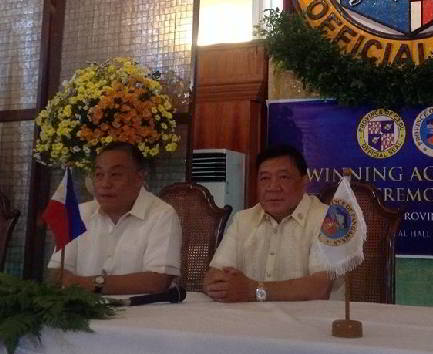
Cebu Gov. Hilario Davide III (left) and Pangasinan Gov. Amado Espino Jr. at yesterday’s signing ceremony at the Cebu provincial capitol’s Social Hall.
Sisterhood ties to open floodgate of cooperation between provinces
Cebu became the first province in the country to forge sisterhood ties with Pangasinan yesterday after the two entered into a sisterhood agreement seen to spur an exchange of best practices in trade and health services between the provinces.
The pact was signed by Cebu Gov. Hilario Davide III and Pangasinan Gov. Amado Espino Jr.
Under the agreement, both parties are required to undertake joint, cooperative projects on trade and investments, tourism arts, culture, sports, health, education, training, agriculture and fisheries, disaster preparedness and environment.
Cebu has existing sisterhood ties with the provinces of Antique, Ilocos Norte, South Cotabato, Bukidnon, Masbate, Laguna and Quezon as well as 16 sisterhood ties with cities and provinces abroad.
Yesterday’s signing will pave the way for a group of businessmen from the northern Luzon province to visit Cebu to jumpstart the intent of the pact, Espino said.
Espino, in his speech at the Cebu provincial capitol, cited Cebu as a “giant in economic progress” while adding that Pangasinan “is still far behind” despite the advances made by his administration on healthcare and environmental management programs.
He said the Pangasinense business delegation will visit Cebu IT Park which houses a number of local and international business process outsourcing (BPO) companies in Cebu City.
Espino said they also want to replicate what Cebu has achieved as a premier tourism hub in the country.
“When we arrived yesterday, we have immediately seen why Cebu is considered a giant in economic progress in our country,” he told the audience which included provincial officials.
“Comparing it (Cebu) to Pangasinan, it is regrettable that past administrations have somehow reneged on their duties, plummeting Pangasinan to one of the underachieving provinces in the country,” he said.
Pangasinan is the home province of President Fidel V. Ramos and former Speaker Jose de Venecia.
Davide last month visited Pangasinan’s public health facilities after hearing that it was one of the few provinces that had their hospitals reach level 3 accreditation from the Department of Health.
In Pangasinan, poor residents were given Philhealth insurance coverage by the provincial government. When the patients covered under the state health insurer started to seek treatment from public hospitals, doctors also benefitted since they get to enjoy additional incentives from Philhealth.
At present, full-time government doctors in Pangasinan now earn an extra P30,000 to P40,000 aside from their monthly salary.
“We started just like with other provinces, we had poor facilities. What we did was to improve our facilities and insure a lot of poor people there through Philhealth so that they’ll go to public hospitals and not to private hospitals,” he said.
“All of our doctors and our nurses want to serve the poor people. But if you provide them with good facilities then they’re too willing to serve. Aside from that, we also raised their salary six times over so that they can be at par with other hospitals,” added Espino.

